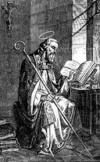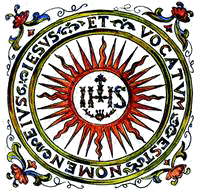St. Hilary of Poitiers

"Athanasius of the West"
Died, A.D. 368
Invoked Against Snakes
FEAST DAY: January 12
"They didn't know who they were." This is how Hilary summed up the problem with the Arian heretics of the fourth century.
Hilary, on the other hand, knew very well who he was -- a child of a loving God who had inherited eternal life through belief in the Son of God. He hadn't been raised as a Christian but he had felt a wonder at the gift of life and a desire to find out the meaning of that gift. He first discarded the approach of many people who around him, who believed the purpose of life was only to satisfy desires. He knew he wasn't a beast grazing in a pasture. The philosophers agreed with him. Human beings should rise above desires and live a life of virtue, they said. But Hilary could see in his own heart that humans were meant for even more than living a good life.
If he didn't lead a virtuous life, he would suffer from guilt and be unhappy. His soul seemed to cry out that wasn't enough to justify the enormous gift of life. So Hilary went looking for the giftgiver. He was told many things about the divine -- many that we still hear today: that there were many Gods, that God didn't exist but all creation was the result of random acts of nature, that God existed but didn't really care for his creation, that God was in creatures or images. One look in his own soul told him these images of the divine were wrong. God had to be one because no creation could be as great as God. God had to be concerned with God's creation -- otherwise why create it?
At that point, Hilary tells us, he "chanced upon" the Hebrew and Christian Scriptures. When he read the verse where God tells Moses "I AM WHO I AM" (Exodus 3:14), Hilary said, "I was frankly amazed at such a clear definition of God, which expressed the incomprehensible knowledge of the divine nature in words most suited to human intelligence."
... But still he was troubled. He knew the giftgiver now, but what was he, the recipient of the gift? Was he just created for the moment to disappear at death? It only made sense to him that God's purpose in creation should be "that what did not exist began to exist, not that what had begun to exist would cease to exist." Then he found the Gospels and read John's words including "In the beginning was the Word, and the Word was with God, and the Word was God. He was in the beginning with God..." (John 1:1-2). From John he learned of the Son of God and how Jesus had been sent to bring eternal life to those who believed. Finally his soul was at rest. "No longer did it look upon the life of this body as troublesome or wearisome, but believed it to be what the alphabet is to children... namely, as the patient endurance of the present trials of life in order to gain a blissful eternity." He had found who he was in discovering God and God's Son Jesus Christ.
... The Arians did not believe in the divinity of Christ and the Arians had a lot of power including the support of the emperor Constantius. This resulted in many persecutions. When Hilary refused to support their condemnation of Saint Athanasius he was exiled from Poitiers to the East in 356. The Arians couldn't have had a worse plan -- for themselves.
Hilary really had known very little of the whole Arian controversy before he was banished ... But being exiled from his home and his duties gave him plenty of time to study and write. He learned everything he could about what the Arians said and what the orthodox Christians answered and then he began to write ... The writings of his that still exist include On the Trinity, a commentary on the Gospel of Matthew, and a commentary on the Psalms ...
... In the East he had also heard the hymns used by Arians and orthodox Christians as propaganda. These hymns were not based on Scripture as Western hymns but full of beliefs about God. Back at home, Hilary started writing hymns of propaganda himself to spread the faith. His hymns are the first in the West with a known writer.
Some of use may wonder at all the trouble over what may seem only words to us now. But Hilary wasn't not fighting a war of words, but a battle for the eternal life of the souls who might hear the Arians and stop believing in the Son of God, their hope of salvation.
The death of Constantius in 361 ended the persecution of the orthodox Christians. Hilary died in 367 or 368 and was proclaimed a doctor of the Church in 1851.
From Catholic Online.




















No comments:
Post a Comment